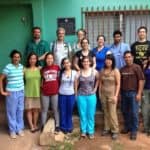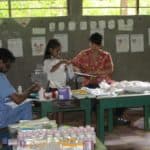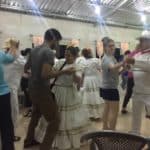 The most recent brigade team at Colomoncagua was certainly cause for great anxiety. It was our inaugural brigade for our new Honduran Brigade Team. Half of the team, Laura and Paul, were in the States for a brief vacation. The brigade itself was completely new to Shoulder to Shoulder, never having visited Honduras as a group in the past. Shoulder to Shoulder has never hosted a brigade in Colomoncagua, this municipality only added to our health care coverage area two months ago. Beyond all this, the brigade members themselves did not comprise a unified group. They consisted of the Maine-Dartmouth Family Medicine Residency, the pharmacy team from Long Island University, a mother daughter mental health team from California, and a nursing student from Bethel College in Indiana. All competent, well-qualified professionals, ready to serve, but unknown to one another in this unfamiliar environment, each must have felt a certain insecurity of how this experiment would turn out. At dinner at the first night, they sat silent, staring at the exotic food on their plates, perhaps escaping deeper into their own heads, focusing on the familiarity of their disciplines, but wondering how they would relate one to another, how would they come together. They were anxious and we were anxious. It seemed someone had dumped the contents of three different jigsaw puzzles on to the table and given us the task of putting all the pieces together into a cohesive whole.
The most recent brigade team at Colomoncagua was certainly cause for great anxiety. It was our inaugural brigade for our new Honduran Brigade Team. Half of the team, Laura and Paul, were in the States for a brief vacation. The brigade itself was completely new to Shoulder to Shoulder, never having visited Honduras as a group in the past. Shoulder to Shoulder has never hosted a brigade in Colomoncagua, this municipality only added to our health care coverage area two months ago. Beyond all this, the brigade members themselves did not comprise a unified group. They consisted of the Maine-Dartmouth Family Medicine Residency, the pharmacy team from Long Island University, a mother daughter mental health team from California, and a nursing student from Bethel College in Indiana. All competent, well-qualified professionals, ready to serve, but unknown to one another in this unfamiliar environment, each must have felt a certain insecurity of how this experiment would turn out. At dinner at the first night, they sat silent, staring at the exotic food on their plates, perhaps escaping deeper into their own heads, focusing on the familiarity of their disciplines, but wondering how they would relate one to another, how would they come together. They were anxious and we were anxious. It seemed someone had dumped the contents of three different jigsaw puzzles on to the table and given us the task of putting all the pieces together into a cohesive whole.

But the first day of our actual clinic work seemed to change this reality, the heavy cloud of anxiety rose and the brightness of common goals of human service and dignity filled the air. A hundred persons waited to be seen at the clinic on that first day. Everyone rushed into action. The nursing crew set up their stations to take vitals. The physicians began seeing the patients, forming opinions, making consultations, and prescribing treatments. The pharmacists set up their medications, and read and filled the prescriptions of the doctors. The professionals assumed their roles with great ease and skill, they appreciated and respected their relationships one with another and the patients, and quality care and compassionate service flowed effortlessly.
By the last clinic day, with over 500 patient visits completed, the dinner table was no longer silent, but laughter, story, and the familiar banter among friends filled the room. A week ago, these people were strangers in a strange land being lead by other strangers to serve the needs of yet others unknown to them. Now they were all colleagues, sharing in common respect for their professional roles. Some of them had even found friendship among one another and among the Hondurans they came to serve. Compassion and service are universal ideals that quickly overcome our insecurities.
It certainly seemed that these puzzle pieces didn’t fit: too many pieces, too many diverse sizes and shapes; too many colors that didn’t blend. But somehow during the course of the week, the pieces found connection. Such a beautiful scene emerged – a harmony of service, commitment, and respect to produce a profound hope for health, well-being, and empowerment.



